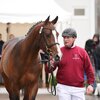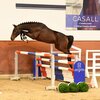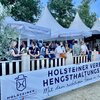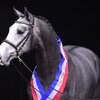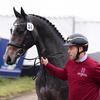With the turn of the year Stephan Haarhoff (27) and Roland Metz (48) haven taken over their new tasks as Verband der Züchter des Holsteiner Pferdes breeding director and executive director, respectively. In this interview, they talk about their plans and visions for shaping the future of the Holsteiner horse.
Mr Metz, you have been with the Holsteiner Verband for almost two years now. Is your taking over even more responsibility now an indication that you are seeing your professional future in Holstein?
Roland Metz: “In retrospect, the first two years have been very busy and eventful and we have achieved a lot – not least due to the breeding community’s strong support. Moreover, my family and I have been settling in very well in Schleswig-Holstein. We have found a new home at a fantastic farmstead in the Elmshorn vicinity, where my wife and daughter feel comfortable as well. Aside from my work for the Holsteiner Verband and the cordial acceptance from the breeders it has been the private situation which has led me to take over more professional responsibility.”
Since 1 January 2021 you are not only in charge of the Holsteiner Verband marketing and auction GmbH but also executive director of the entire body of the Holsteiner Association. Where do you see the key aspects of your working life in the future?
Roland Metz: “I consider it a major task to maintain the Holsteiner Verband’s competitiveness also in the future. Even though the market for the German breed societies is getting more and more difficult, the studbook ‘Holstein Global‘ has been the first step in the right direction. It is important to live and push forward this opening in order to secure the Holsteiner horses’ share in the market in the future as well. In addition to that we are going to keep an eye on maintaining high-quality service for our members. Separating the post of breeding and executive director provides the executive director with an even greater capacity to pay attention to economics without losing sight of a close and lateral exchange with the breeding director. I am thinking for example how to optimise events, generate advertising revenue, and boost the Elmshorn facility as the Holsteiner breeders’ home port.“
Over the past years, the Holsteiner Verband has been opening up in various directions. This also includes topics like services for breeders and digitalisation. Do you have any plans whether and how to expand these sectors in the future? Roland Metz: “As already mentioned before, I consider it one of the most important tasks to strengthen and expand the Holsteiner horses’ share in the market. Digitalisation provides an important tool as it has been facilitating online registration of foals and mares for some years now. Moreover, the last delegate assembly decided to lower the admission fee from 300 euros to 100 euros. So we have set an example, making us more attractive compared to other studbooks. In terms of further digitalisation, the Corona pandemic forced us to consider new paths last year, which, looking back, I am happy to say have worked out well. I am referring to our experiences with online and hybrid auctions, which we are definitely going to use for the breeding sector as well. In a nutshell, we – and here I am speaking for Stephan Haarhoff as well as myself – want to position the Holsteiner Verband for the future in a modern and successful way.”
Mr Haarhoff, with the turn of the year you have succeeded Dr. Thomas Nissen as Holsteiner Verband breeding director. What was your motivation to apply for this post?
Stephan Haarhoff: “Considering the horse bug runs in our family and I have had it since I was as child, I have known from an early age that I wanted to turn my passion into a career and have trained accordingly early on. In addition to a degree in agriculture, I completed numerous internships with breed societies, professional qualifications, and finally a two-year-course as junior manager in the breeding department. When the Holsteiner Verband advertised the post of breeding director, I knew immediately that I wanted to apply.”
You have been with the Holsteiner Verband for almost one and a half year now – first as junior manager and then as assistant to the breeding director. What are your impressions so far?
Stephan Haarhoff: “For me, the time I have spent with the Holsteiner Verband so far has just flown by. These past 1.5 years I have been accepted very cordially and have already met a great number of passionate horse people. Many Holsteiner Verband procedures and events have a long-established tradition which, on the one hand, must be preserved, and on the other hand adjusted to modern requirements and modernised accordingly.”
Over the past years, the Holsteiner Verband has continued to open up the breeding programme, with the studbook ‘Holstein Global’ providing numerous new opportunities in this respect. How do you assess this development?
Stephan Haarhoff: “I think this has been the right step. Today’s breeders want to be free in their decisions and breed their mares to stallions that inspire and convince them. Moreover, the past has shown that selective use of outside blood may definitely bring about the desired breeding progress.”
You have been instrumental in the ongoing modernisation of the asterisk model for Holsteiner brood mares. Why has the model been adjusted and what new developments can the breeders prepare for?
Stephan Haarhoff: “With our breeders mostly geared to (top level) sport, we are putting greater importance on sport results with the asterisk model as well. The upcoming changes apply to the mares’ own as well as offspring performance. I am curious about the revision’s effect and which mares receive the most stars.”
This means the revised model is much more geared to sport results. Will FEI data be taken into consideration as well?
Stephan Haarhoff: “Yes, they are considered as well. In order to increase the informative value of the asterisk model, including international sport data is absolutely necessary. Over the past years, the sport has changed a lot – it has become even more international, establishing series, like for example the Global Champions Tour. Moreover, many Holsteiner horses have been sold abroad and achieved noticeable results in competition there. As a consequence, the model is going to incorporate FEI data from 2021 onwards, resulting in a considerable increase in the flow of information.
The post of breeding director is very responsible and important position. What are your expectations?
Stephan Haarhoff: “There is a lot of anticipation for my new task, along with due respect for the success of my predecessor, Dr. Thomas Nissen. In addition to this, I am looking forward to many constructive conversations with the breeders. The new crop of foals is going to be born in the upcoming weeks and months and I am very excited to see how in particular the young first-time sires pass on to their offspring and whether the breeders’ decisions for a stud fulfil the expectations.“
Photo Janne Bugtrup: Stephan Haarhoff and Roland Metz (from left to right) are to work in close cooperation as the Verband der Züchter des Holsteiner Pferdes breeding director and executive director, respectively.
